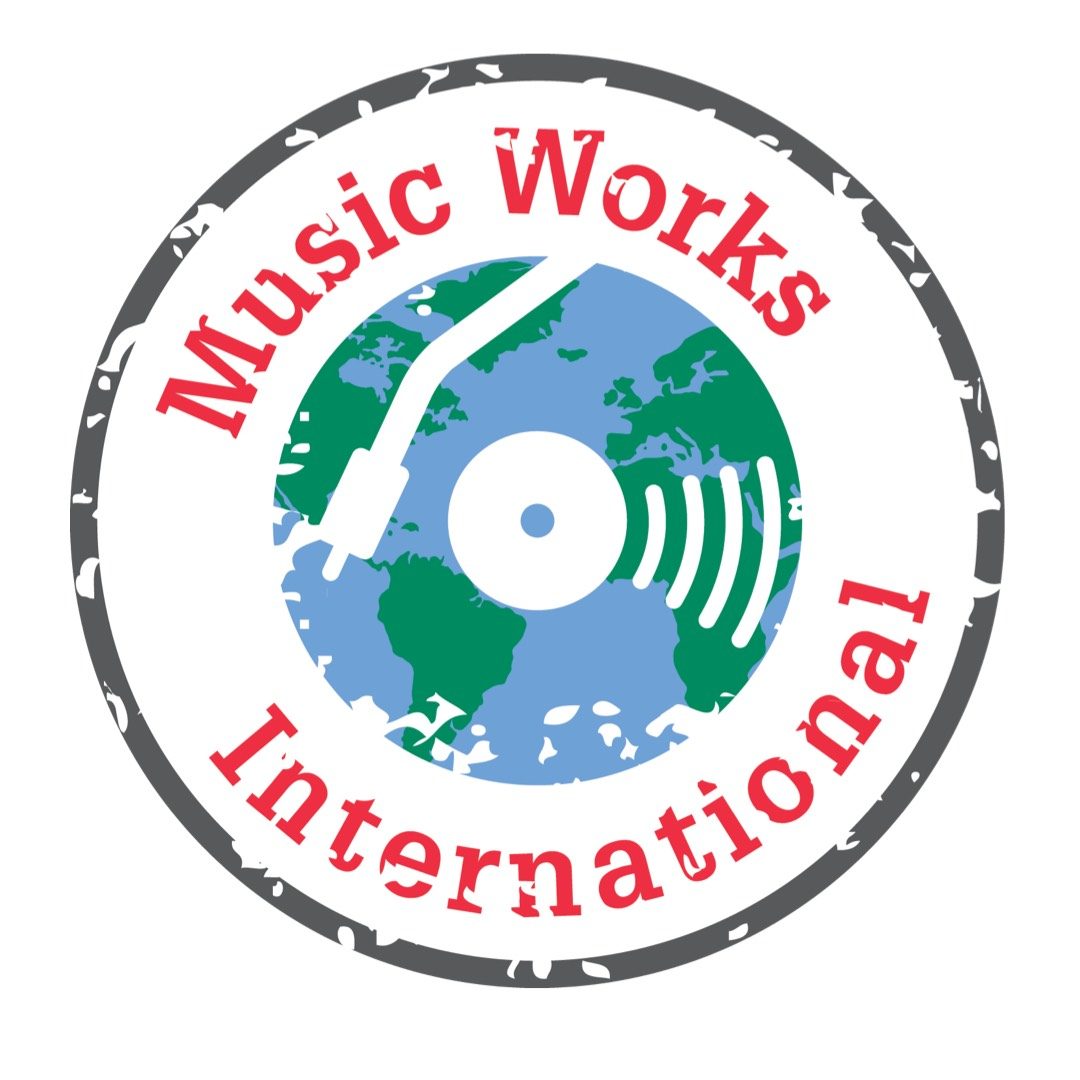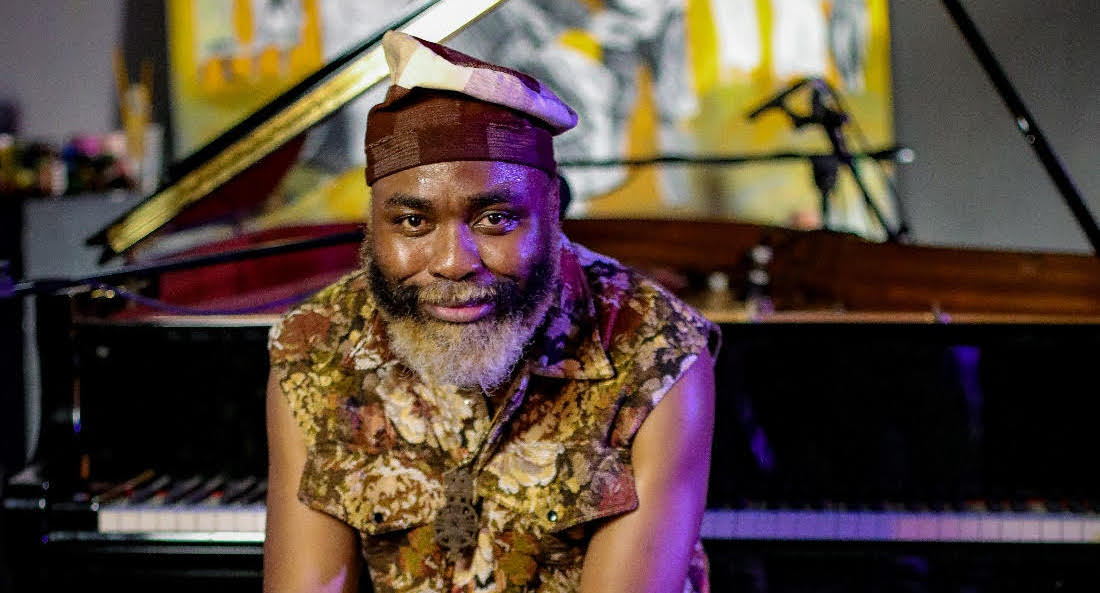Nduduzo Makahathini
Nduduzo Makhathini grew up in the lush and rugged hillscapes of umGungundlovu in South Africa, a peri-urban landscape in which music and ritual practices were symbiotically linked. The area is significant historically as the site of the Zulu king Dingane kingdom between 1828 and 1840. It is important to note that the Zulu, in fact the African warrior code, is deeply reliant on music for motivation and healing. This deeply embedded symbiosis is key to understanding Makhathini’s vision.
The church also played a role in Makhathini’s musical understanding, as he hopped from church to church in his younger days in search of only the music. The legends of South African jazz are deep influences as well, Bheki Mseleku, Moses Molelekwa, and Abdullah Ibrahim. “The earlier musicians put a lot of emotions in the music they played,” he says. “I think it may also be linked to the political climate of those days. I also feel there is a uniqueness about South African jazz that created an interest all around the world and we are slowly losing that too in our music today. I personally feel that our generation has to be very conscious about retaining these nuances in the music we play today.”
Through his mentor Mseleku, Makhathini was also introduced to the music of John Coltrane’s classic quartet with McCoy Tyner. “I came to understand my voice as a pianist through John Coltrane’s A Love Supreme,” he says. “As someone who started playing jazz very late, I had always been looking for a kind of playing that could mirror or evoke the way my people danced, sung and spoke. Tyner provided that and still does in meaningful ways.” Makhathini also cites American jazz pianists including Andrew Hill, Randy Weston and Don Pullen as significant influences.
Active as an educator and researcher, Makhathini is the head of the music department at Fort Hare University in the Eastern Cape. He has performed at renowned festivals including the Cape own International Jazz Festival and the Essence Festival (in both New Orleans and South Africa), and in 2019 made his debut appearances the Blue Note Jazz Club in New York City, as well as Jazz at Lincoln Center where he was a featured guest with Wynton Marsalis and the Jazz at Lincoln Center Orchestra on their 3-night musical celebration The South African Songbook in Rose Theater. He is a member of Shabaka Hutchings’ band Shabaka and the Ancestors appearing on their 2016 album Wisdom of Elders, and has also collaborated with artists including Logan Richardson, Nasheet Waits, Tarus Mateen, Stefon Harris, Billy Harper, Azar Lawrence, and Ernest Dawkins.
In addition to producing albums for his peers (such as Thandiswa Mazwai’s Belede and Tumi Mogorosi’s Project Elo), Makhathini has released eight albums of his own since 2014 when he founded the label Gundu Entertainment in partnership with his wife and vocalist Omagugu Makhathini. Those albums earned him multiple awards and include Sketches of Tomorrow (2014). Mother Tongue (2014). Listening to the Ground (2015), Matunda Ya Kwanza (2015); Icilongo: The African Peace Suite (2016) Inner Dimensions (2016), and Reflections (2016). His 2017 album Ikhambi was the first to be released on Universal Music South Africa and won Best Jazz Album at the South African Music Awards (SAMA) in 2018. His Blue Note debut Modes of Communication: Letters from the Underworlds was released in 2020 to wide critical acclaim earning many end of the year “Best Of” lists.
His third Blue Note release, “uNomkhubulwane,” is set to be released on June 7 2024.
Routes of Discovery w/ Hamilton de Holanda
Over the past few years as the Black Lives Matter movement has gained momentum, igniting protests over police brutality and systemic racism, people everywhere have been confronted anew with the ugly history of slavery, racism, and discrimination of people of color all over the world. Routes of Discovery is a very special project created by two world-class musicians who are icons in their own countries of Brazil and South Africa. Hamilton de Holanda and Nduduzo Makhathini mix the DNA of their cultural heritage to explore the diaspora of African musical culture to North and South America through the slave trade. In the New World, Slaves had only their culture, rich in music, language, folk tales, and spirit, the few shards of their past life which could not physically be taken from them. Routes of Discovery is an unprecedented musical suite, created from the perspective of Hamilton and Nduduzo that tells the saga and the drama from colonization to the present day.
HAMILTON de HOLANDA Virtuosic, brilliant and unique just a few adjectives given to Hamilton as he developed his career studded with awards. In his own hands, the 10 string Mandolin is almost a new instrument, disentangling this emblematic Brazilian instrument from the legacy of some of its influences and styles, to make it a global instrument. Hamilton has composed 24 Caprices for mandolin and In the US, the press soon dubbed him the “Jimi Hendrix of bandolim.” Hamilton’s phrasing, the extra strings, and his powerful sound, combined to the speed of the solo passages and improvisations, has inspired a new generation and a new sound.
NDUDUZO MAHKHATHINI Over the course of his eight previous albums, perhaps what one can learn from the career of pianist, composer, and producer Nduduzo Makhathini is that an artist has achieved a tremendous breakthrough when they can tell a story so layered that its reach is limitless. Makhathini grew up in the lush and rugged hillscapes of umGungundlovu in South Africa, a peri-urban landscape in which music and ritual practices were symbiotically linked. The area is significant historically as the site of the Zulu king Dingane kingdom between 1828 and 1840. It’s important to note that the Zulu, in fact, the African warrior code, is deeply reliant on music for motivation and healing.
Contact Info
Label & Press | Blue Note Records, Cem Kurosman
Discography | Nduduzo Makhathini on Allmusic.com

